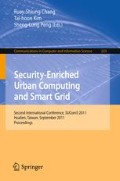Abstract
The technique of parallel loop self-scheduling has been successfully applied to auto-parallelize rule-based expert systems previously. In a heterogeneous system, different compute nodes have different computer powers. Therefore, we have to choose a node to run the master process before running an application. In this paper, we focus on how different master nodes influence the performances of different self-scheduling schemes. In addition, we will investigate how the file system influences the performance. Experimental results give users the good guidelines on how to choose the master node, the self-scheduling scheme, and the file system for storing the results.
Access this chapter
Tax calculation will be finalised at checkout
Purchases are for personal use only
Preview
Unable to display preview. Download preview PDF.
References
Dean, J., Ghemawat, S.: MapReduce: Simplified Data Processing on Large Clusters. In: Proceedings of the 6th Conference on Symposium on Operating Systems Design & Implementation, vol. 6, p. 10 (2004)
Wu, C.-C., Lai, L.-F., Ke, J.Y., Jhan, S.-S., Chang, Y.-.: Designing a Parallel Fuzzy Expert System Programming Model with Adaptive Load Balancing Capability for Cloud Computing. Journal of Computers 21(1), 38–48 (2010)
Wu, C.-C., Lai, L.-F., Chang, Y.-S.: Towards Automatic Load Balancing for Programming Parallel Fuzzy Expert Systems in Heterogeneous Clusters. Journal of Internet Technology 10(2), 179–186 (2009)
Wu, C.-C., Lai, L.-F., Yang, C.-T., Chiu, P.-H.: Using Hybrid MPI and OpenMP Programming to Optimize Communications in Parallel Loop Self-Scheduling Schemes for Multicore PC Clusters. Journal of Supercomputing (2009), doi:10.1007/s11227-009-0271-z
Wu, C.-C., Lai, L.-F., Chang, Y.-S.: Extending FuzzyCLIPS for Parallelizing Data-Dependent Fuzzy Expert Systems. Journal of Supercomputing, doi:10.1007/s11227-010-0542-8
FuzzyCLIPS, http://www.iit.nrc.ca/IR_public/fuzzy/fuzzyClips/fuzzyCLIPSIndex2.html
Author information
Authors and Affiliations
Editor information
Editors and Affiliations
Rights and permissions
Copyright information
© 2011 Springer-Verlag Berlin Heidelberg
About this paper
Cite this paper
Wu, CC., Lai, LF., Huang, LT., Yang, CT., Lu, C. (2011). The Performance Impact of Different Master Nodes on Parallel Loop Self-scheduling Schemes for Rule-Based Expert Systems. In: Chang, RS., Kim, Th., Peng, SL. (eds) Security-Enriched Urban Computing and Smart Grid. SUComS 2011. Communications in Computer and Information Science, vol 223. Springer, Berlin, Heidelberg. https://doi.org/10.1007/978-3-642-23948-9_18
Download citation
DOI: https://doi.org/10.1007/978-3-642-23948-9_18
Publisher Name: Springer, Berlin, Heidelberg
Print ISBN: 978-3-642-23947-2
Online ISBN: 978-3-642-23948-9
eBook Packages: Computer ScienceComputer Science (R0)

